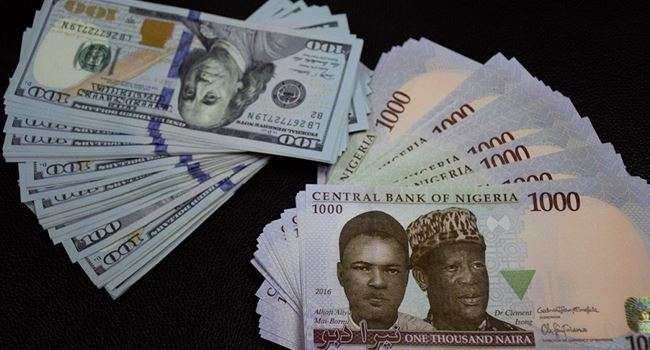The Central Bank of Nigeria (CBN) is expected to keep the naira/US dollar exchange rate near the current NGN416/USD over the course of the year, according to Fitch Solutions.
The research firm believes that the naira may hover around a narrow band, but will end 2022 very close to the spot rate of NGN414/USD. This is anchored on two views, first, policy making is expected to be on hold until 2023 presidential election.
A vivid example is the abandonment of the scrapping of expensive fuel subsidy scheme in March 2022. There is doubt over whether this policy will be pushed any further, now that politicians are firmly focused on the up-coming elections.
“While President Muhammadu Buhari is barred from seeking re-election, a devaluation in the months ahead of the vote could be seen as an embarrassment for the ruling All Progressives Congress. Many politicians in Nigeria oppose any weakening of the naira, believing that a strong currency is a sign of economic success and provides a boost to consumers.”
Fitch Solutions
The second has to do with the fact that, the 32% rise in oil price since the start of 2022 has boosted Nigeria’s foreign exchange reserves, providing support for the country’s external position and increasing the CBN’s ability to counteract any weaknesses.
Based on Fitch’s assessment, the currency tends to be quite stable for months at a time, and then depreciates sharply when pressures on foreign reserves increase and the CBN accepts a weaker exchange rate. Since June 2021, policy makers have kept the currency essentially stable against the US dollar, following a 30 per cent depreciation during the COVID-19 crisis.
According to Fitch, reserves have remained stable at about US$40 billion since the start of 2022. Fitch estimates that the current reserve pile is equal to about 5.2 months of reserves.

Nigeria’s External Position to Remain Strong
Given elevated oil prices, Nigeria’s external position, and relatedly, its FX market will remain strong over the coming quarters, Fitch noted. The research firm expects that the country’s current account deficit will narrow from 1% of GDP in 2021 to 0.5% of GDP in 2022.
Accordingly, this will increase the availability of US dollars in the economy and support the naira. This will reduce the likelihood that the CBN will even have to intervene.
Peeking into the future, it is expected that the naira will return to its gradual depreciatory path after the 2023 presidential election, Fitch noted. While inflation is expected to average 16.7 per cent year-on-year in 2023, which will erode the purchasing power of the currency in real terms.
Even so, the depreciation of the naira in 2020 moved the real effective exchange rate (REER) back towards its long-term average, suggesting that it is no-longer significantly overvalued.
“We have penciled in a fall to NGN430/USD by end of next year, and an average decline of 1.7% on 2022 levels. This would mark a continuation of then recent trend. While we expect that reserves will remain robust in 2023, the actual pace of currency depreciation will depend more heavily on the outlook of the next president.
“If, however, President Buhari is succeeded by his reformist vice president, Yemi Osinbajo, then it is likely that the currency will be allowed to weaken more rapidly. While this would push up inflation in the short run, a weaker currency would probably help the economy over the longer term by damping down import demand and encouraging the development of non-oil exports.”
Fitch Solutions
However, Fitch noted that risks to short and long term forecasts are weighted towards more, than less, depreciation. The currency would come under more pressure than currently anticipated if a hit to oil prices or output resulted in a worsening of the economy’s external position.
“A disputed election, or one that is sees an eruption of protests and violence could also put pressure on the currency, though given the state of the CBN’s reserves and the experience of recent elections, this seems less likely.”
Fitch



















